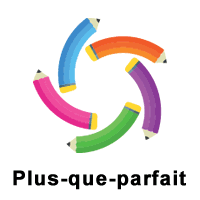
This entry was posted in Grammaire and tagged grammaire by Stacy Justo. Si seulement les conditions n’avaient pas été dificiles! – If only the conditions hadn’t have been hard!.Si seulement j’avais lu pour mes devoirs! – If only I had read for my homework!.It’ll be great to relate to other people when speaking in French! The expression translates to “If only….”. Sometimes si can be followed by the adverb seulement (only). To express things we regret in the past, we use le plus-que-parfait after si. – She had already written her story when you read it. Elle avait déjà écrit son histoire quand tu l’ai lu.It’s placed right before the past participle. Déjà indicates that the event had to have happened first in order for the other event to take place in the past. This is a key word to keep in mind when distinguishing between the remote and recent past.

Notice how in the first example, the word “déjà” in incorporated into the sentence.

The plus-que-parfait is made up of an auxiliary ( être or avoir) conjugated in the. With Lingolia Plus you can access 17 additional exercises about Le plus-que-parfait, as well as 629 online exercises to improve your French. The plus-que-parfait is used to talk about actions/events that took place before a specific point in the past. | Imparfait form of être + past participle of descendre.| Descendre is an irregular verb.|In constructions using être, the past participle agrees in gender and number with the subject (Juliette → feminine singular).

| Imparfait form of avoir + past participle of recevoir.| Recevoir is an irregular verb. Est-ce qu'elles (aller) déjà dans ce restaurant? | Imparfait form of être + past participle of aller.| -er verbs construct the past participle using é.|In constructions using être, the past participle agrees in gender and number with the subject (elles → feminine plural).Remember – not all verbs follow the typical conjugation rules. | Imparfait form of avoir + past participle of chercher.| -er-verbs construct the past participle with é.Ĭomplete the sentences using the correct plus-que-parfait form of the verbs in brackets. | Imparfait form of avoir + past participle of rendre.| Rendre is an irregular verb.|See the list of irregular verbs. | Imparfait form of avoir + past participle of choisir.| -ir verbs construct the past participle with i.



 0 kommentar(er)
0 kommentar(er)
